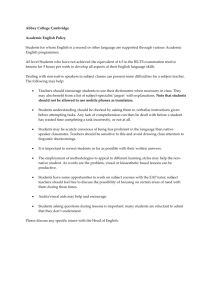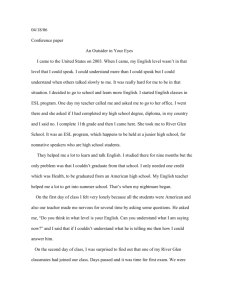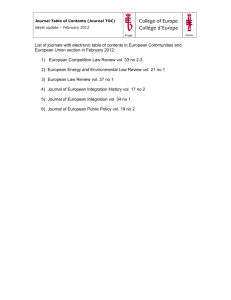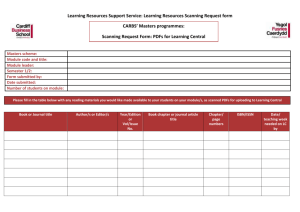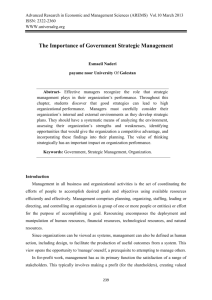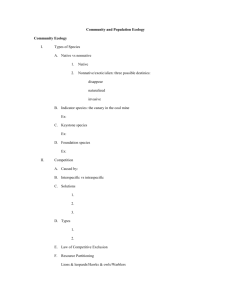How to Become an Effective English Language Teacher Serkan Uygun
advertisement
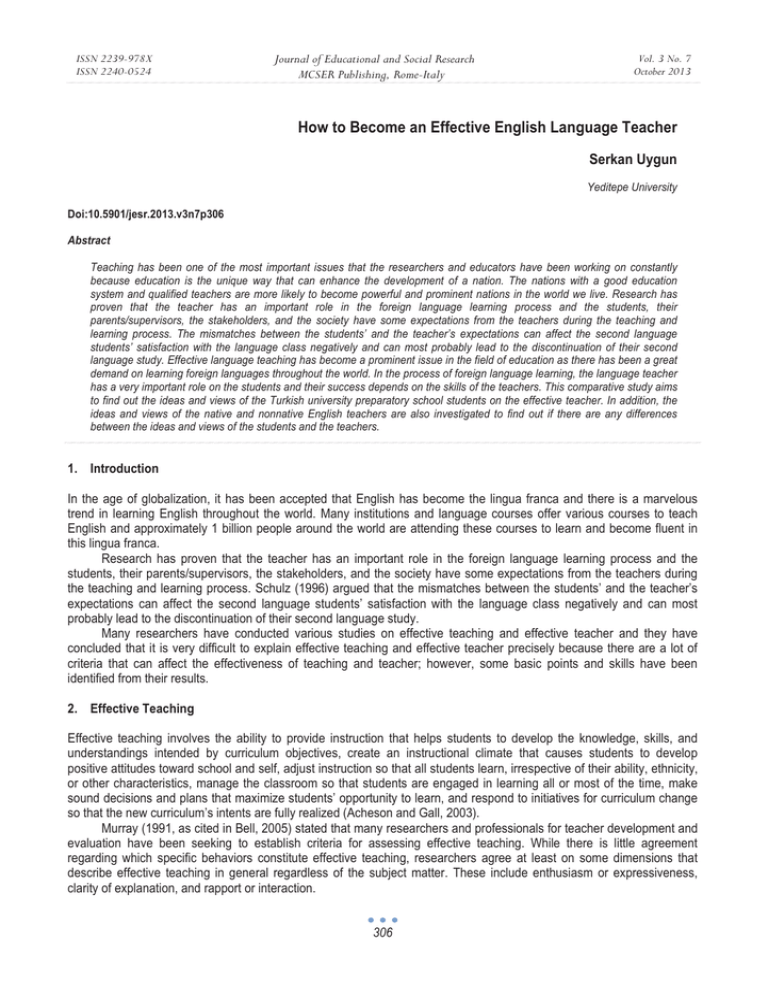
ISSN 2239-978X ISSN 2240-0524 Journal of Educational and Social Research MCSER Publishing, Rome-Italy Vol. 3 No. 7 October 2013 How to Become an Effective English Language Teacher Serkan Uygun Yeditepe University Doi:10.5901/jesr.2013.v3n7p306 Abstract Teaching has been one of the most important issues that the researchers and educators have been working on constantly because education is the unique way that can enhance the development of a nation. The nations with a good education system and qualified teachers are more likely to become powerful and prominent nations in the world we live. Research has proven that the teacher has an important role in the foreign language learning process and the students, their parents/supervisors, the stakeholders, and the society have some expectations from the teachers during the teaching and learning process. The mismatches between the students’ and the teacher’s expectations can affect the second language students’ satisfaction with the language class negatively and can most probably lead to the discontinuation of their second language study. Effective language teaching has become a prominent issue in the field of education as there has been a great demand on learning foreign languages throughout the world. In the process of foreign language learning, the language teacher has a very important role on the students and their success depends on the skills of the teachers. This comparative study aims to find out the ideas and views of the Turkish university preparatory school students on the effective teacher. In addition, the ideas and views of the native and nonnative English teachers are also investigated to find out if there are any differences between the ideas and views of the students and the teachers. 1. Introduction In the age of globalization, it has been accepted that English has become the lingua franca and there is a marvelous trend in learning English throughout the world. Many institutions and language courses offer various courses to teach English and approximately 1 billion people around the world are attending these courses to learn and become fluent in this lingua franca. Research has proven that the teacher has an important role in the foreign language learning process and the students, their parents/supervisors, the stakeholders, and the society have some expectations from the teachers during the teaching and learning process. Schulz (1996) argued that the mismatches between the students’ and the teacher’s expectations can affect the second language students’ satisfaction with the language class negatively and can most probably lead to the discontinuation of their second language study. Many researchers have conducted various studies on effective teaching and effective teacher and they have concluded that it is very difficult to explain effective teaching and effective teacher precisely because there are a lot of criteria that can affect the effectiveness of teaching and teacher; however, some basic points and skills have been identified from their results. 2. Effective Teaching Effective teaching involves the ability to provide instruction that helps students to develop the knowledge, skills, and understandings intended by curriculum objectives, create an instructional climate that causes students to develop positive attitudes toward school and self, adjust instruction so that all students learn, irrespective of their ability, ethnicity, or other characteristics, manage the classroom so that students are engaged in learning all or most of the time, make sound decisions and plans that maximize students’ opportunity to learn, and respond to initiatives for curriculum change so that the new curriculum’s intents are fully realized (Acheson and Gall, 2003). Murray (1991, as cited in Bell, 2005) stated that many researchers and professionals for teacher development and evaluation have been seeking to establish criteria for assessing effective teaching. While there is little agreement regarding which specific behaviors constitute effective teaching, researchers agree at least on some dimensions that describe effective teaching in general regardless of the subject matter. These include enthusiasm or expressiveness, clarity of explanation, and rapport or interaction. 306 ISSN 2239-978X ISSN 2240-0524 Journal of Educational and Social Research MCSER Publishing, Rome-Italy Vol. 3 No. 7 October 2013 Berliner and Rosenshine (1977), Blair (2000), Brophy and Good (1986), Cawelti (1999), Cotton (2000), DemmonBerger (1986), Good and Brophy (1997), Marzano, Pickering, and McTighe (1993), Porter and Brophy (1988), Shellard and Protheroe (2000), Taylor, Pearson, Clark, and Walpole (1999), and Wenglinsky (2000, as cited in Stronge, 2002) conducted research on effective teaching and they have come into the conclusion that effective teachers are interested in having students learn and demonstrate understanding of meanings rather than merely memorizing facts or events, place priority on reading because it affects success in other content areas and overall achievement gains, and students have higher achievement rates when the focus of instruction is on meaningful conceptualization, especially when it builds on and emphasizes their own knowledge of the world. 3. Effective Teacher Researchers and scholars have tried for over a century to create a schema that would describe and codify effective teachers. Kratz (1896, as cited in McEwan, 2002) asked a group of students to identify the characteristics that distinguished the teachers from whom they learned the most from those whom they liked the most. Four characteristics of teachers who were successful were found out to be making greater demands of the students, more teaching skill, more knowledge of subject matter, and better discipline. There are many ways to characterize the components that make up an effective teacher. These components include content knowledge, general pedagogical knowledge, curriculum knowledge, pedagogical content knowledge, knowledge of learners and their characteristics, knowledge of educational ends, purposes, and values, and knowledge of educational contexts (Clark and Walsh, 2002). Walker (2008) found out that there were 12 identifiable personal and professional characteristics of an effective teacher in his study and these characteristics included being prepared, being positive, having high expectations, being creative, being fair, displaying a personal touch, developing a sense of belonging, admitting the mistakes, having a sense of humor, giving respect to students, forgiving, and being compassionate. Taúkafa (1989, as cited in Telli, den Brok, and ÇakÕro÷lu, 2008) interviewed 43 middle school students and asked them to write down their teacher’s desirable and non-desirable characteristics. Giving positive reinforcement, interacting friendly with students, and understanding students’ feelings were the most frequently mentioned desirable characteristics. The non-desirable characteristics of a teacher in this study were: isolating some of the students, giving specific students preferential treatment, denying students chances to perform or to talk in class, sneering at students, and demanding students to learn. Çetin (2001, as cited in Telli, den Brok, and ÇakÕro÷lu, 2008) conducted a study with 100 higher education students to find out the ideal teacher behaviors which were defined as understanding, cooperative, be aware of students’ individual differences and general student psychology, together with having good subject matter knowledge and using different teaching methods in the class. 4. Effective Foreign Language Teaching Brosh (1996) asked second language teachers and students to identify the three most prominent characteristics of an effective second language teacher from a list of 20 characteristics and the results of the study revealed that the students’ and teachers’ first and second rank-ordered items were identical which were the teachers’ adequate command of the subject matter involving the teachers’ mastery of the four basic skills and the ability of the language teacher to transmit knowledge in a way that is easy to understand and remember, and to motivate their students to do their best. In general, the desirable characteristics of an effective second language teacher that emerged from the study were knowledge and command of the target language, the ability to organize, explain, and clarify, as well as to arouse and sustain interest and motivation among students, fairness to students by showing neither favoritism nor prejudice, and availability to students. According to Bell (2005), the research literature suggests that there is no single accepted definition of effective foreign language teaching. Foreign language teaching is a complex, multidimensional process that means different things to different people. An effective foreign language teacher is the teacher who is clear and enthusiastic in teaching that provides learners with the grammatical (syntactical and morphological), lexical, phonological, pragmatic, and sociocultural knowledge and interactive practice they need to communicate successfully in the target language. Demirel (1990) and Saraç-Süzer (2007, as cited in ArÕkan, Taúer, and Süzer, 2008) studied the qualities attached to an effective foreign language teacher and listed having personal strategies to teach, creating a positive classroom atmosphere, to be able to a model teacher, being knowledgeable on target cultures, possessing positive personal 307 ISSN 2239-978X ISSN 2240-0524 Journal of Educational and Social Research MCSER Publishing, Rome-Italy Vol. 3 No. 7 October 2013 characteristics, having correct pronunciation of the English sounds, teaching with effective classroom materials, and using technology as the most common features. 5. Statement of Problem Effective language teaching has become a prominent issue in the field of education as there has been a great demand on learning foreign languages throughout the world. In the process of foreign language learning, the language teacher has a very important role on the students and their success depends on the skills of the teachers. This comparative study aims to find out the ideas and views of the Turkish university preparatory school students on the effective teacher. In addition, the ideas and views of the native and nonnative English teachers are also investigated to find out if there are any differences between the ideas and views of the students and the teachers. This study aims to find an answer to the following research questions: 1. What are the most important characteristics of an effective English language teacher according to the Turkish university preparatory school students? 2. What are the most important characteristics of an effective English language teacher according to the nonnative English teachers? 3. What are the most important characteristics of an effective English language teacher according to the native English teachers? 4. Are there any similarities and differences in the important characteristics of an effective English language teacher among the Turkish university preparatory school students, nonnative English teachers, and native English teachers? 6. Participants The participants of the study consisted of 38 students, 7 nonnative English teachers and 7 native English teachers. These students were attending the preparatory program of a private university in Istanbul, Turkey. The participants’ age range was between 18 and 22. 7 of the participants were male and 31 of them were female students. The nonnative English teachers were teaching at the preparatory program of a private university in Istanbul, Turkey. All the teachers were experienced in their field and they have been teaching English for more than 10 years. The nonnative English teachers’ age range was between 30 and 36. 2 of them were male and 5 of them were female. The native English teachers were teaching at the School of Foreign Languages department of a private university in Istanbul, Turkey. All the teachers were experienced in their field and they have been teaching English for more than 10 years. The nonnative English teachers’ age range was between 30 and 42. 4 of them were male and 3 of them were female. 7. Instrument The questionnaire consisted of 24 items on what an effective foreign language teacher should do and they were rated on a four-point scale (1= strongly disagree, 2= disagree, 3= agree, and 4= strongly agree). This instrument made extensive use of Bell’s (2005, as cited in Brown, 2009) questionnaire and evolved after being piloted three times with different second language learners. Participants indicated their views and ideas by using this scale. 8. Procedure The participants completed the questionnaire which lasted 20 minutes and the results of the questionnaire were analyzed to find the answers of the research questions of the study. 9. Data Analysis The results of the questionnaire were analyzed via SPSS 15. For the first three research questions, descriptive statistics were used to get the mean scores of the items in the questionnaire. For the fourth research question, Kruskal Wallis test was conducted to check if the differences between the scores were significant or not. The reason to conduct Kruskal Wallis test was that two of the independent variables had a 308 ISSN 2239-978X ISSN 2240-0524 Journal of Educational and Social Research MCSER Publishing, Rome-Italy Vol. 3 No. 7 October 2013 population that was lower than 30. For the significant differences, Mann Whitney U test was conducted as a post-hoc test between the three independent variables which were the students, native teachers, and nonnative teachers. 10. Results of Research Question 1-2-3 The first three research questions of the study dealt with the most important characteristics of an effective English language teacher according to the Turkish university preparatory school students, native English teachers, and nonnative English teachers. The results showed that, an effective English language teacher should frequently use computer-based technologies (Internet, CD-ROM, e-mail) in teaching the language, base at least some part of students’ grades on completion of assigned group tasks, devote as much time to the teaching of culture as to the teaching of language, require students to use the language outside of class with other speakers of the language (internet, e-mail, clubs, community events, and so on), not use Turkish in the foreign language classroom, only correct students indirectly when they produce oral errors instead of directly (correctly repeating back to them rather than directly stating that they are incorrect), be as knowledgeable about the culture of those who are native speakers of English, teach the language primarily by having students complete specific tasks rather than grammar-focused exercises, address errors by immediately providing explanations as to why students’ responses are incorrect, speak English with native like control of both grammar and accent, teach grammar by giving examples of grammatical structures before explaining the grammar rules, use predominantly real-life materials in teaching both the language and the culture rather than the text book, base at least some part of students’ grades on their ability to interact with classmates successfully in English, and use activities where students have to find out unknown information from classmates using English. In addition, the students, native English teachers, and nonnative English teachers disagreed with the items stating that an effective English teacher should allow the students to respond to test questions in listening and reading via Turkish rather than English, not use predominantly small groups or pair work to complete activities in class, and not present a particular grammar point without illustrating how the structure is used in a specific, real world context. 11. Results of Research Question 4 The fourth research question dealt with if there were any similarities and differences in the important characteristics of an effective English language teacher among the Turkish university preparatory school students, nonnative English teachers, and native English teachers. The results of the Kruskal Wallis test conducted for the questionnaire indicated that there were significant differences in the results of the six statements. These statements were statement 5, 12, 13, 14, 17, and 18. Statement 5 stated that an effective foreign language teacher should not correct students immediately after they make a mistake in speaking. The results indicated that there were significant differences between the students and nonnative teachers. While the students disagreed with this statement, the nonnative teachers agreed with it. In addition, significant differences were found between native teachers and nonnative teachers. Although the native teachers disagreed with this statement, the nonnative teachers agreed with it. Statement 12 stated that an effective foreign language teacher should have students respond to commands physically in English. The results indicated that there were significant differences between the students and native teachers. The students disagreed with this statement; however, the native teachers agreed with it. Statement 13 stated that an effective foreign language teacher should address errors immediately providing explanations as to why students’ responses are incorrect. The results indicated that there were significant differences between the students and nonnative teachers and native teachers and nonnative teachers. The students and native teachers agreed with this statement, whereas the nonnative teachers disagreed with it. Statement 14 stated that an effective foreign language teacher should require students to speak in English beginning the first day of class. The results indicated that there were significant differences between the students and native teachers. While the students disagreed with this statement, the native teachers agreed with it. Statement 17 stated that an effective foreign language teacher should ask students to begin speaking in English only when they feel they are ready to. The results indicated that there were significant differences between the students and native teachers. Although the students disagreed with this statement, the native teachers agreed with it. Statement 18 stated that an effective foreign language teacher should not present a particular grammar point without illustrating how the structure is used in a specific, real-world context. The results indicated that there were significant differences between the students and native teachers and students and nonnative teachers. The students 309 ISSN 2239-978X ISSN 2240-0524 Journal of Educational and Social Research MCSER Publishing, Rome-Italy Vol. 3 No. 7 October 2013 disagreed with this statement, whereas the native and nonnative teachers agreed with it. 12. Discussion The main purpose of the present study was to find out the characteristics of an effective English teacher by asking the views and opinions of the students, native teachers, and nonnative teachers. And the results of the study have revealed some important characteristics and qualities of an effective English teacher. According to the results, an effective English teacher should frequently use computer-based technologies (Internet, CD-ROM, e-mail) in teaching the language, base at least some part of students’ grades on completion of assigned group tasks, require students to use the language outside of class with other speakers of the language (internet, e-mail, clubs, community events, and so on), not use Turkish in the foreign language classroom, only correct students indirectly when they produce oral errors instead of directly (correctly repeating back to them rather than directly stating that they are incorrect), not grade language production (speaking and writing) primarily for grammatical accuracy, teach the language primarily by having students complete specific tasks rather than grammar-focused exercises, speak English with native like control of both grammar and accent, teach grammar by giving examples of grammatical structures before explaining the grammar rules, use predominantly real-life materials in teaching both the language and the culture rather than the text book, not simplify or alter his/her speaking of English so that students can understand every word being said, base at least some part of students’ grades on their ability to interact with classmates successfully in English, use activities where students have to find out unknown information from classmates using English, not allow the students to respond to test questions in listening and reading via Turkish rather than English, use predominantly small groups or pair work to complete activities in class, not use activities that practice specific grammar points rather than activities whose goal is merely to exchange information, be friendly, creative, caring, fair, enthusiastic, have a sense of humor, give homework, take attendance, have lived in a foreign country, use pair and group work activities, using technology and visual materials, have correct pronunciation, make students feel relaxed, manage the classroom effectively, use real-life situations while explaining, and make learners discover the language. These are the important qualities that an English teacher should take into consideration so that the English lessons can be more effective and beneficial for the students of English. The results of the present study are consistent with the studies conducted by Brown (2009) and ArÕkan, Taúer, and Süzer (2008). 13. Implications The most important implication of the study is that especially the results of the questionnaires conducted to the students should be taken into consideration by the teachers of English. These questionnaires can be conducted by the head of the English departments at schools to find out the views and ideas of how an effective English teacher should be and the results of the questionnaires can be shared with the English teachers working in these schools. By doing this, the teachers will be able to know the views and opinions of the students and they can adjust their teaching accordingly. Another important implication can be that the Ministry of National Education can conduct these questionnaires around the country and prepare INSET programs for the English teachers to inform them about the views of the students on how an effective English teacher should be. 14. Limitations As for most studies, the present study also has several limitations that restrict the results to be generalized. First of all, the number of participants in the study was low to get more generalizable results. Especially, the number of native and nonnative teachers was very low which led the researcher to analyze the data by using nonparametric tests. Secondly, the adjectives that described the qualities in the second questionnaire were vague terms that can cause to have different meanings for different participants. And finally, the questionnaire could be backed up by interviews in which the participants could be asked to explain the reason of their answers in the questionnaire. 15. Recommendations for Further Research This study can be conducted with a large number of participants so that parametric tests can be used to analyze the data and the results can be generalized. Moreover, the study can be conducted in different parts of the country and the results 310 ISSN 2239-978X ISSN 2240-0524 Journal of Educational and Social Research MCSER Publishing, Rome-Italy Vol. 3 No. 7 October 2013 can be compared to see if regional differences affect the results of the study. Furthermore, by using semi-structured interviews, more data can be collected from the participants and it will be easier to generalize the results. And finally, the results of the study can be compared with the results of the same study conducted in other countries to find out the similarities and differences in the results. References Acheson, A. K. and Gall, M. D. (2003).Clinical Supervision and Teacher Development: Pre-service and In-service Applications. New York: John Wiley & Sons, Inc. ArÕkan, A., Taúer, D., and Süzer, H.S.S. (2008). The Effective English Language Teacher from the Perspectives of Turkish Preparatory School Students, Education and Science, Vol. 33, No. 150, pp. 42-51. Bell, T. R. (2005). Behaviors and Attitudes of Effective Foreign Language Teachers: Results of a Questionnaire Study, Foreign Language Annals, Vol. 38, No. 2, pp. 259-270. Brosh, H. (1996). Perceived Characteristics of the Effective Language Teacher, Foreign Language Annals, Vol. 29, No. 2, pp. 125-136. Brown, A. V. (2009). Students’ and Teachers’ Perceptions of Effective Foreign Language Teaching: A Comparison of Ideals, The Modern Language Journal, Vol. 93, No. 1, pp. 46-60. Clark, J. C. and Walsh, J. (2002). Elements of a Model of Effective Teaching, Australian Association for Research in Education, Retrieved from:http://www.aare.edu.au/02pap/wal02220.htm McEwan, E. K. (2002). 10 Traits of Highly Effective Teachers: How to Hire, Coach, and Mentor Successful Teachers. California: Corwin Press, Inc. Schulz, R. A. (1996). Focus on Form in the Foreign Language Classroom: Students’ and Teachers’ Views on Error Correction and the Role of Grammar, Foreign Language Annals, Vol. 29, No. 3, pp. 343-364. Stronge, J. H. (2002). Qualities of Effective Teachers, Virginia: Association for Supervision and Curriculum Development. Telli, S., den Brok, P. and ÇakÕro÷lu, J. (2008). Teachers’ and Students’ Perceptions of the Ideal Teacher, Education and Science, Vol. 33, No. 149, pp. 118-129. Walker, R. J. (2008). 12 Characteristics of an Effective Teacher, Educational Horizon, Vol. 87, No. 1, pp. 61-68. 311
